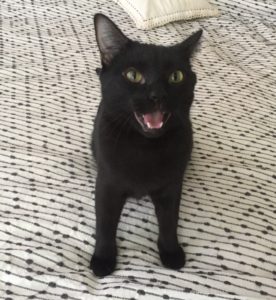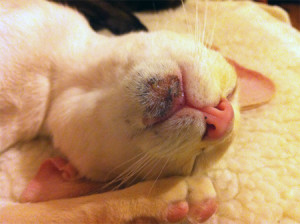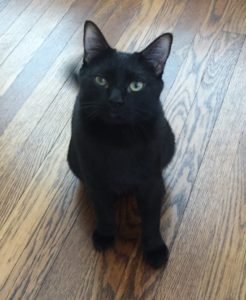Food Sensitivities And Food Allergies In Cats

Mario
Can your cat get food allergies?
Food. We often take it for granted because most people can process it without any problems. Food allergies in people are very much on the rise and have been for the past couple of decades. Unfortunately they are also becoming more and more prevalent in cats, too. With so many inappropriate ingredients in cat food these days and the fact that most cats eat the same thing all the time, I’m surprised that more cats don’t have this issue. Let’s take a closer look at food sensitivities and food allergies in cats and how to eliminate them for good!
What is the difference between food allergies and food sensitivities (intolerance)?
According to wikihow.pet,
Food allergies and food intolerance are not the same, although they both often have a similar course of treatment and are both caused by a reaction to a protein. Your cat can have the same food allergies for life, whereas their food intolerance can be triggered by specific ingredients or environmental conditions. Understanding the difference between the two will help you differentiate between symptoms and help you seek the best method of treatment.
Food allergies are generally categorized as adverse reactions to food in which the immune system is involved. (Examples would be itchy skin or hot spots, hives, swelling, or auto-immune disorders.)
Food intolerance is categorized as an adverse reaction that does not involve the immune system. (Examples are vomiting and diarrhea.)
What are the causes and symptoms?
In general the root of food allergies or sensitivities can be traced to a lack of variety in diet, lacking the proper enzymes to digest the food, chemicals in the food, toxins/food poisoning, and even naturally occurring by-products in food like histamines. When it comes to pets the number one cause is over-exposure; they develop allergies to things they are most frequently fed. In fact, I’ve learned over the years that chicken, fish and dairy are the most common culprits. This is why it’s so important to rotate proteins.
The most common symptoms that indicate a possible food allergy in cats include skin rashes, itchy skin, hot spots, hives, swelling, sneezing, coughing or wheezing. The most common symptoms for food sensitivities include diarrhea, gas, vomiting. Digestive and respiratory issues may be similar to other ailments and diseases, so it may be necessary for your vet to help rule them out.
True stories
 I have had first hand experience with food allergies with my own cats over the years. When Lili was very young she developed feline acne which a vet later linked to a food allergy. Our Naturopath was able to muscle test and found the culprit to be chicken. Using a process called ECR at Heights of Health she was able to reprogram the cells in Lili’s body not to have a reaction to chicken. Now she eats all the chicken she wants, and her feline acne has never come back.
I have had first hand experience with food allergies with my own cats over the years. When Lili was very young she developed feline acne which a vet later linked to a food allergy. Our Naturopath was able to muscle test and found the culprit to be chicken. Using a process called ECR at Heights of Health she was able to reprogram the cells in Lili’s body not to have a reaction to chicken. Now she eats all the chicken she wants, and her feline acne has never come back.
Snowbear developed kitty bronchitis, and the vet couldn’t determine what was causing it. His answer was to put Snow on steroids and some kind of medicine–I can’t remember now it’s been so long ago. One dose of steroid made poor Snow puff up like he had gained 5 pounds! Needless to say I never gave him another dose, and the symptoms didn’t go away. It wasn’t until I took him off kibble completely his bronchitis pretty much cleared up!
Mario

Mario
Just recently I had the pleasure to do an assessment on a cute little four month old kitten named Mario. His mom, Sonia, reached out to me because he had chronic diarrhea, and it smelled horrible! She had taken him to the vet a couple of times to rule out parasites and other issues, but the diarrhea and runny poo would reappear. The vet even thought that putting him on a hypo-allergenic diet (Green Pea and Duck by Natural Balance) and a good quality probiotic would help; it didn’t.
Using a technique called muscle testing I checked every ingredient in the kibble and canned food he was eating and quickly discovered what was causing his issues: green peas, pea protein, and canola oil. Pet food manufacturers have started using plant proteins to boost the amount of protein in the food; essentially it’s a way of replacing more expensive meat proteins with cheaper plant proteins. They are also using cheap omega 6 oils like canola instead of high quality omega 3 oils like salmon, sardine, and cod liver. Cat’s lack the ability to break down plant proteins and carbohydrates, so their bodies don’t process it very well. In Mario’s case his body was producing diarrhea as a response.
After informing Sonia of the results she immediately switched his diet. He is now eating a raw, meat-based diet and loving it! And the best part is that his poop went back to normal immediately. And no more foul odors!
This just goes to show you how important diet can be! When you feed your cat a food they’re not biologically designed to eat there will be complications. Cats who eat kibble also tend to have VERY stinky poop. My guess is that it’s all the grains and carbohydrates in the food. Back in the day when I used to feed my cats a kibble diet we could smell their poop from several rooms away. When we took these ingredients out of their diet the horrible odor went away. Truly amazing!
Eliminate your cat’s food allergies and sensitivities for good
If you suspect your cat may have an allergy or sensitivity to something she’s eating there are a couple things you can do. You can try an elimination diet where you offer a novel protein exclusively for several weeks. If the symptoms go away it you have a better idea of what to avoid. Make sure to read the cat food labels carefully though. The two most common foods that cause allergies are chicken and fish, and you can find chicken in almost everything!
The other thing you can do is ECR (energetic cellular release). The practitioners at Heights of Health have been using this technique on people and pets for years to successfully eliminate the allergy triggers. I personally prefer this method because it addresses the CAUSE and doesn’t just treat symptoms. Sessions can be done in person or remotely.
Mario’s mom, Sonia, gave me an update on him when I was writing this post, and he loves his new raw food! She first gave him duck (Stella and Chewies), and it went over without even a bit of fuss. However, he vomited after trying venison, which tells me he’s sensitive to it. This can easily be remedied with an ECR clearing if she’s interested in pursuing the matter. Otherwise he just needs to avoid it.
Here’s a good article if you’d like to learn more.
Does your cat have food allergies or sensitivities? If so, how have you dealt with it? Share in the comments below and don’t forget to share this article on your favorite social channels!
Sign up to get all our posts here!

